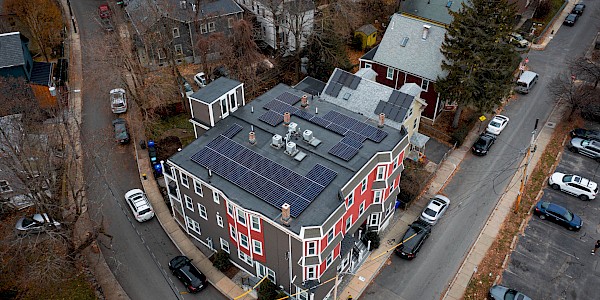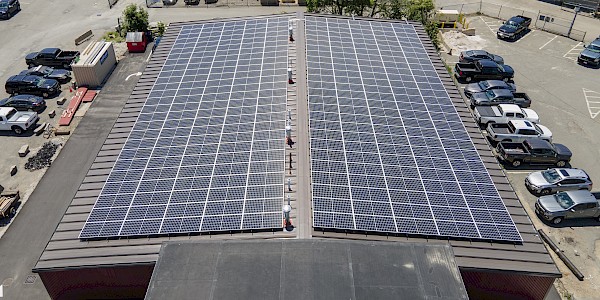Your Consumer Protection Solar Guide: What You Should Know
Oct. 24, 2019
Just when you thought the days of pushy salesmen going door to door were over, you hear the “knock-knock” on your front door and there’s another one, with a clipboard trying to sell you solar panels. The solar industry in Massachusetts is growing and growing, which means there are more choices than ever when it comes to finding a solar provider.
How can you know which solar installers aren’t going to install a poorly designed system using sub-par components? How can you know whether or not your solar panels are safe? If your solar panel installation isn’t carried out with care and precision, you could be missing out on decades of fixed energy costs, renewable energy, and reduced carbon emissions. Before you start searching for “solar providers near me,” take a second to learn about how the solar industry is setting the standard for better business practices, so you the consumer gets the best deal and service for your energy needs.
Our Commitment to Best Practices
At Boston Solar, we maintain a passion for both solar energy and customer service, which fuels our compliance with the latest code of ethics and certifications in the industry. This includes best practice documents published by the Clean Energy States Alliance, the Massachusetts Department of Energy and Resources, and the Solar Energy Industries Alliance. Here at Boston Solar, we welcome new ethics and standards for the industry like the recently released California Solar + Storage Association (CALSSA) consumer protection rules, which may not directly apply to Massachusetts based solar installers, but is setting the standard for best practices in the industry.
The Massachusetts DOER Homeowner’s Guide to Solar
The Department of Energy and Resources here in Massachusetts created a handy guide for homeowners looking to go solar. Though this document deals primarily with the financial options of going solar, at Boston Solar we look at it as the baseline standard for what customers should expect from their solar experience. We think every solar-curious homeowner should familiarize themselves with this guide, to gain a better understanding of the financing options available and to better protect against misleading information.
SEIA Solar Business Code
The Solar Energy Industries Association (SEIA) has created a Solar Business Code document to “promote transparency, good faith, and understanding in the
U.S. solar energy industry.” The Solar Business Code covers:
-
Guiding business principals
-
Unfair, deceptive, or abusive acts or practices
-
Advertising
-
Sales and marketing interactions
As an organization, SEIA operates under the mission of increasing consumer knowledge of solar transactions. Aligning this solar consumer education with solar contractor best practices means you can trust a solar installation company in good standing with SEIA to install safe solar components at a fair price.
Solar customers who have had an experience with a solar contractor that does not meet the requirements of the business code can (and are encouraged to) file a formal complaint with SEIA. This is one of the most important checks and balances of solar consumer protection.
The CALSSA Consumer Protection Rules - What We Can Learn From California
This code of ethics outlines the state requirements for California solar providers, to protect homeowners and business owners from misleading information. It also describes the industry certifications required to be in good standing with CALSSA, like state board certifications and licenses.
Putting Customers First
These new Consumer Protection rules go as far as outlining best practices for selling solar in California, and these standards can be an example for other states and solar installers to follow. According to the latest in solar provider ethics, a trusted contractor will*:
-
Respect consumer privacy, including complying with all applicable privacy, telemarketing, door-to-door sales, and email solicitation laws and regulations.
-
Consider a consumer’s mental capacity and ability to understand the terms of a contract and adjust their approach in response to that capacity.
-
Not mislead or deceive consumers (directly or by omission). Special attention must be paid to material aspects of a solar offering, such as: pricing, performance warranties, and company affiliations/endorsements.
*from the CALSSA Code of Ethics
Why We are The #1 Massachusetts Based Solar Installer
At Boston Solar, we keep a close eye on the national solar industry, so we can provide better service in our local solar community. By following these guidelines for best practices, we can better educate our customers on what to expect from their newly installed solar PV systems. With more than 4,000 solar installs under our belt, we have honed our process so that you and your family have all the information you need from beginning to end.
Want to hear what some of those 4,000 homeowners and business owners think about their experience going solar with Boston Solar? Check out our long list of reviews! Each and every job is special to us, and we are thankful our customers show their appreciation by sharing their experience with a review.
_____________________________________________________________________________________
You deserve a local solar installation company you can trust. Call Boston Solar and schedule your free solar quote today — give us a ring at 617-858-1645 or you can get in touch here.




